#getting published
Text
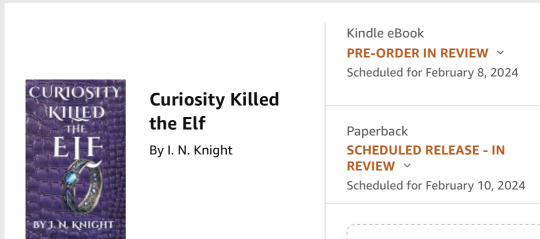
HI YES HELLO IT'S HAPPENING!!!!!!!!!!!!
MY BOOK IS BEING PUBLISHED THIS MONTH AND I AM EXCITED!!!!!!! Please order it and tell me what you think!!! It'll be available for Preorder on February 8th 2024, and the paperback will be released on February 10th 2024. Both will be available on Amazon and Kindle.
The story is called Curiosity Killed the Elf by (me) I. N. Knight and the synopsis is as follows:
When Princess Allonwë finds a bracelet in a secret chamber that isn't supposed to exist, she thinks nothing of it until a haunted suit of armor comes to life and tries to kill her. Narrowly escaping, she loses the bracelet in a bet before finding out it was a weapon of mass destruction. Deciding to go on an adventure to get it back, Allonwë must hurry and retrieve it before her parents find out it was her that lost it in the first place and ground her for a millennia.
Join the princess and her bodyguard, Natanael, on their adventure as they battle talking dragons, confront a conspiracy theorist elf that might not be as crazy as he sounds, and deal with a persistent chicken that will just not leave them the cluck alone. Together they face the archmage and necromancer who has a plan for the bracelet once he gets his hands on it. But can Allonwë and Natanael survive these encounters or are they in far over their heads?
*~*~*
I would LOVE to have your support and feedback to help an indie author just get their foot in the door for bigger and brighter things!!!
#inks rambles#inks writes#original writing#original stories#original books#writing#writeblr#publishing#publish#getting published
58 notes
·
View notes
Text
"Man, Earth animals would be incredibly invasive on another planet."
"Yeah, rabbits are already a huge problem in Australia! Imagine what kind of havoc they could wreak on an alien ecosystem."
"Like if space poachers stole some, then crashed."
"Any alien criminals who did that would deserve…”

A Swift Kick to the Thorax
It’s available today! Tell your friends and enemies!
Img ID: the cover of the sci-fi novel “A Swift Kick to the Thorax.” It features a veterinarian’s prescription pad floating in space, with the title written in the prescription area. A pen floats behind it and a chunk has been bitten out of the pad.
#humans are weird#humans are space orcs#my writing#getting published#today's the day! woo!#this has been a long time coming#I'm going to write more short stories to go with it soon#A Swift Kick to the Thorax#Robin Bennett#the Token Human#book recs
986 notes
·
View notes
Text
Questions to Ask Before Signing With a Literary Agent
Getting published might be your dream, but meeting with a literary agent is more like a job interview. You’ll be professional partners. They should prioritize your vision for your manuscript while guiding you on the best path to bookstore shelves.
If you get to meet with a potential agent for your next book, consider asking these questions to ensure that you’ll work well together.
What Did You Like About My Manuscript?
The agent’s answers will reveal what they’re most interested in working on. You’ll also learn what they consider to be your strengths as a writer.
If they’re interested in your story for reasons other than its intended purpose or your vision, you’ll prevent yourself from signing a contract based on a misunderstanding.
Do You Want a One-Time Client or a Long-Term Writer?
Literary agents are very busy.
The average literary agent makes $37,482 per year and given that most of the big publishers headquarter in New York City or L.A. where the average cost of living requires $63,600 annually in NYC and $30,640 for L.A. rent alone each year, it’s understandable that many agents do their agenting work alongside a full-time job.
Some will only have the time and energy for a one-time client who has a stand-alone project ready to go. Others may have more time in their schedule to commit to a long-term working relationship with a writer.
If you’re interested in turning your manuscript into a series, exploring other genres, or have ideas for future projects, the answer to this question is crucial.
Why Did You Become a Literary Agent?
It’s important to get to know someone before working with them. This is a standard question for anyone in a job interview. You deserve an agent who’s passionate about helping authors, especially first-time authors if you’ve never been published before.
How Long Have You Been an Agent?
A new literary agent could have gained the experience to become great in their own agency by working with other agents at a publishing house for years. Others may have a law degree, but little real-world experience yet.
What you do with the answer to this question is up to you. The new lit agent could be the best person for your book because they have the energy, focus, drive and passion to help you succeed. But you might also benefit from having a more experienced agent if your manuscript will be tricky to sell. (More on that below.)
What Did You Love about the Books You Sold Recently?
You should already know the agent’s latest sold books based on the query research that made them a good person to query. However, looking at a list of titles is different than hearing why the agent cared about those manuscripts in the first place. It shows part of their character and their interests, which may or may not fully line up with your hopes for our writing future.
What’s Your Communication Style like throughout the Publishing Process?
Some agents are very hands-on during the publishing process and some prefer to send occasional updates so you don’t get weighed down by details you don’t understand.
Again, how you react to the agent’s answer is up to you. There are tons of reasons why you may or may not want a hands-on agent, just like there are tons of reasons why agents might keep you posted for the most important info. They can explain a bit more after answering your initial question.
How Many Clients Are You Currently Representing?
Agents with a long list of clients might make enough from agenting that they can handle a big client team and still devote enough attention to be by your side through the publishing process. Others may only have a few clients because that’s the best balance for their work life and communication.
Having fewer clients doesn’t mean an agent is bad news. Don’t forget to follow up to this question if you want more information.
Are You Involved in the Editing Process?
Editors often take over when a manuscript needs work before publishers consider it or after a publisher signs on to sell it. Agents sometimes jump into the work with their clients if they have the time to do so.
Editing can take a while since broad developmental editing almost always happens before agents pitch a manuscript. How many people you want to communicate with throughout that process depends on your communication preferences and the agent’s editing expertise.
When Do You Believe My Book Will Go Out on Submission?
If your agent has read your full manuscript, they may have an idea of how much editing you’ll need to do. One agent who wants major changes could indicate that the process might take up to a year, while another could estimate three months of editing work in your future.
This also means they have different visions for your book’s final draft. You can talk more about that in detail after they estimate the editing time prior to submissions.
How Long Did the Submission Process Take for Your Other Clients?
Agents have to pitch manuscripts to publishing houses. It’s like the query process for writers, but for agents. They often know which houses are more likely to pick up specific stories based on their industry connections and previous sale experience too.
That being said, the submission process takes an average of 4–6 weeks. If the agent’s previous clients took longer or shorter than that, it’s important to know why. They may have been up against industry factors out of their control or could have learned better ways to sell books based on past mistakes that took longer than necessary.
Do You Think My Manuscript Will Be Challenging to Sell in Today’s Market?
Consider your history of reading. At different ages and stages of your life, you were likely into different genres and themes. The book industry as a whole also goes through stages.
Sometimes, a fantasy book about a high schooler and her vampire boyfriend makes everyone preorder the next YA vampire book they can find. Other times, all people want to read are bubblegum romance books with familiar plot formulas because the latest copies from the biggest romance writers have everyone swooning.
Books can also become more likely to sell if they involve a societal topic or challenge that everyone’s talking about.
It’ll be more challenging to sell books that don’t appeal to anything readers are currently buying en masse. Challenging—but not impossible. The best agent for your book will identify potential challenges and plan ways to navigate around them or spin them into something appealing to publishers.
They might also pitch editing ideas to tweak your story closer to what sells in a similar age group or genre. Whether or not you agree that those ideas align with what you envisioned for your book is up to you.
Do You Manage Subsidiary, Foreign, and Film Rights?
Subsidiary rights are the legal rights to every non-physical form of your book. A literary agent will know how to handle traditional book rights (rights concerning printing, manufacturing, and distribution), but also managing subsidiary rights makes them an even better advocate for you.
They’ll negotiate for your rights to do things like have a say in which publications gain excerpts from your book for PR purposes, who can make book-club editions, which company makes an audiobook, and how many languages your book gets translated into.
Foreign rights are the rights for a company to publish your book in its original language in countries where it wasn’t initially published. Related, there are translation rights that go with that too.
Film rights cover things like how much you and/or your publisher get paid when a company purchases the rights to turn your book into a movie. It doesn’t include the rights for the author to be involved in casting or screenplays (unless the author is already super big and/or has a hand in the film world).
Agents who can do all of these things reduce how many pieces of your profit pie you have to give to each person helping your book succeed. They also streamline who you trust with such big decisions.
What Happens if My Manuscript Doesn’t Sell?
Agents set their own time limits on trying to sell a manuscript based on factors like their own schedule, the market’s interest, how many publishers they’ve contacted, etc.
Some agents set a hard time limit and recommend writing another book if your initial one doesn’t sell. Unfortunately, they may not feel like the right representation for the new book if it’s wildly different from what you initially queried.
Others will try selling a manuscript for a few years. They might believe it will be a hit, but they need to wait for changes in the market or publishers to become available for work like yours.
There’s really no wrong answer to this question. It’s just good information to have, especially if you’re interviewing more than one agent before signing with anyone.
How Many Deals Have You Made in the Last Year and What Were the Figures?
You’ll know the publicly announced book deals the agent has made before you speak with them based on your query research. However, there may be other deals you don’t know about.
It’s also important to get the figures for each deal to estimate your potential book deal number. You should compare your standing to authors of similar standing that the agent recently helped get published.
If you’re a debut author comparing yourself to long-time authors with six-figure deals, you won’t have a similar experience unless you’re the one in a million who has an instant hit with your book sales.
What Are Our Next Steps after I Sign?
You’d typically ask this in a regular job interview to know if you need to go through other interviews or if you’ll get an employment contract.
After signing with your agent, they’ll lead you through the various steps to getting published. They’ll likely have personal revision suggestions, then want to submit your revised work to editors. Then the editing process begins.
Your agent should know your next general steps before you sign the contract. If you sign, they’ll get more specific with details like which editors they think will be a good fit for your work and when they can schedule meetings with you to go over their revision suggestions.
-----
Getting to this point with an agent at all is a huge success. So many writers never get published or even send a query letter. Congratulate yourself for getting this far and don’t be afraid to ask more questions than the ones I’ve listed here. More information will lead to a more informed decision when you decide to sign or not.
199 notes
·
View notes
Text
So, my book—Stoneheart—is going to be republished this year! Yay! It's all shiny and new, and we've worked so hard on developing so many things. I truly love the story @alana-k-asby and I have written. In light of this, I'll be sharing quotes, vibes, aesthetics, and more about my writing, along side my love of homemaking, Tolkien, Band of Brothers, SGA, Leverage, and more!
Later this year our fantasy western adventure story will be available!
#personal#Stoneheart#homemaking#jrr tolkien#band of brothers#stargate atlantis#leverage#writers#writing#writeblr#getting published#i'm excited#and terrified#but mostly#excited#but a little terrified#salt and light
27 notes
·
View notes
Text
There Is No Point in My Being Other Than Honest with You: On Toni Morrison’s Rejection Letters
by Melina Moe

“I FOUND IT extremely honest, forthright, and moving in ways I had not expected it to be,” Toni Morrison wrote to an aspiring novelist in 1977, “but it is a shuddering book and one that offers no escape for any reader whatsoever.” Still, Morrison, then a senior editor at Random House, liked the manuscript so much that, before responding, she passed it around the office to drum up support. The verdict was “intelligent,” but also “very ‘down,’ depressing, spiritually abrasive.” Whatever the merits of the writing, Morrison’s colleagues predicted, the potent mix of dissatisfaction, anger, and mournfulness would limit the book’s commercial appeal—and Morrison reluctantly agreed. “You don’t want to escape and I don’t want to escape,” her letter concludes, “but perhaps the public does and perhaps we are in the business of helping them do that.”
During her 16 years at Random House, Morrison wrote hundreds of rejection letters. Usually typed on pink, yellow, or white carbonless copy paper, and occasionally bearing Random House’s old logo and letterhead, these are now filed among her correspondence in the Random House archives at Columbia University’s Rare Book & Manuscript Library. While many of the letters were mailed to New York, Boston, and even Rome, others were sent to writers in more obscure places; some are addressed to “general delivery” in various small towns across the United States.
READ MORE
9 notes
·
View notes
Note
Heya, this is probably just in my head cause I've been typing up a story, but I've been writing books for years but have no clue how publishing works so other than typing one up out of my notebooks and currently working on typing up another nothing gets done with them.
If I wanted to like submit a novel to Gollancz to see if you'd publish it would I need like a writing agent or something?
Hi there! Congratulations on all your writing! Getting started is the hardest part, followed by actually finishing the dang thing (and then followed by whichever bit of editing the author is currently on and therefore hating the most)
We are occasionally open to unsolicited/unagented submissions, however as we are still (shamefully) working through our last batch - thanks to a grave underestimating of how many we would get, and overestimating of how much time we had around everything else - I can't say for certain when we plan to re-open them.
That said, even for authors we pick up through unagented submissions, we would generally recommend that they look into getting a literary agent, and often will refer them to agents we work with regularly! This is for a number of reasons that will benefit both you and us:
Your agent will have a broader knowledge of your genre pool, and be able to submit your work to editors within the field more broadly. If they've been around a while, they'll also have a sense of what each editor's tastes are so they know where it's worthwhile to try.
Your agent should be your biggest champion. They should have a good knowledge of publishing contracts, so they understand what's standard to be asked, and what is unusual. That helps manage expectations for both the author and the publisher in negotations.
They will act as a relationship buffer: when your book is acquired, it'll be based on passion and excitement, and - particularly if you're a debut author - it can be very hard to bring up things you're uncomfortable with for fear of rocking the boat or damaging the relationship with your editor. Your agent gets the lovely job of being able to be the person who can communicate any concerns or things you're upset with directly to your editor, without you having to feel like you have to throw your toys out of the pram directly. The nature of a go-between might feel like a bit of a game of Telephone, but it's actually really valuable to also take a step back from the situation and can often take the panic out of discussions. (Note: You should NEVER be in a situation where you feel like your editor is making you uncomfortable or that they wouldn't take feedback well, however the relationships between authors and editors and agents and editors are very different)
They can focus on the business administration side of things while you get to focus on the fun bit of actually being creative!
There are loads of ways you can pitch to agents - whether it's through one of the many pitching events (PitchWars, PitMad, specific pitching hashtags on twitter etc.), through writing competitions (The Future Worlds Prize is one we're directly involved with for unrepresented British SFF writers of colour) or as a direct submission. If you are submitting directly to an agent, make sure that you check:
Are they open to submissions?
Do they represent books in your area?
What are their submission guidelines?
Most agents will get inundated with submissions - more than it's feasible to read! And if you aren't in their genre, or don't follow their submission guidelines, it's a quick way to get your work disregarded without it even being looked at. Check out Manuscript wishlists, agent websites, and agents' social media to see what's going on!
On tumblr, @literaticat has a wonderful 'Ask the Agent' blog and I really recommend it. Agents on twitter often run AMAs as well, depending on what else is happening, so keep an eye out there.
I hope this is helpful! I'm always happy to answer publishing and writing questions, and good luck with your writing!
17 notes
·
View notes
Text
I just sent The Tengu And The Angel off to be formatted. It's almost ready for publication now. I'm this close to being an actual published author, and I'm so excited I could burst. AAAAAAAAAAAAAAAAAAAAAAAAAAAAAAAAAAAAAAAAAA
#thetenguandtheangel#books#writeblr#writing#kunioyoshioka#kunio#nathanielbythesea#alina capella#queerbooks#getting published#author#novel writing#romance#aaaaaaaaaaaaaaaaaaa
7 notes
·
View notes
Photo

#writer#writer memes#other writers#getting published#publishing a book#working on characters#writing characters#novel writing#story writing#book writing#writing takes foreverrrrrr#writing requires patience#creative writing#other writers getting published#published author#wannabe author#writing#writing memes#aspiring author
133 notes
·
View notes
Note
What was the process of getting yourself published? Did you get an agent or did you shop it yourself? Who edited it your or someone else? How long did it take from beginning to end? Was your story originally a fan fic? Who is your publisher / what printing house / company took you on? Thanks!
Thank you so much for these questions @twinsoulvisionary! There is a lot here so I will try to keep it brief and helpful!
I’ll go a little out of order so it makes more sense! Follow me below the cut!
Death Coach was written because I have two people in my life, one a published romance novelist and the other a family member, who had read lots of my fanfic and said I should write something original. So I took a few days to come up with an idea for something I thought I would care about enough to write an original novel about it.
The idea was simple “Detective gets involved with serial killer he’s hunting.” That was it. 😈
As to the question of if it was originally a fanfic, it was written explicitly to NOT be a fanfic, explicity to be something I could sell. However it’s no secret to anyone who knows me that Detective Walker is a thinly-veiled Luke Skywalker avatar, and Terana is at least physically very much like Mara Jade. There are tons of Easter Eggs in my novel for Star Wars fans, and I don’t want to drop them all here, but absolutely you will find other Star Wars-inspired characters in the book.
About the timeline:
Death Coach was finished in Dec 2018 and published in Dec 2022, so four years later. How about that? I’m just so happy it’s done! *checks box*
How long did it take to write?
Everyone writes at a different pace, but when I’m writing and have time to do it, I am super fast. I think Death Coach was written (first draft complete of 80k) in about 3 weeks. The first two days after I started it, I was already 20k into the book. I edit as I go—one of my habits with this book, so I didn’t lose any threads, was to reread what I’d written at least every other day. I could fix things, tweak, and proofread as I read. I think especially if you are writing a story where there are aspects of mystery or clues needing to be dropped, it’s a good habit to reread your draft often before you continue.
So I was on fire and the story wrote itself (as my stories often do).
I edited it myself (I consider myself an excellent editor, no false modesty here) but my sister, who is also a great proofreader, double-checked (and did find things I’d missed).
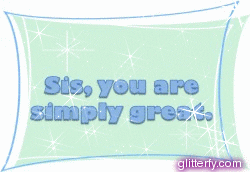
For getting published, it was a long and rocky road. I sent the book to many agents and publishers at the same time. I made a packet, query letter, checked all the boxes.
I did get a few offers fairly quickly, but they always seemed unappealing. For example, one publisher came back and said they loved the story but since their readership was primarily into dominant males, they suggested flipping the characters or making Terana more sub and Walker more domineering. That (if you’ve read the book you’ll understand) is a completely different novel, and not a story that interested me. One asked for more queer sexual content. One wanted more explicit childhood trauma for the serial killer. Another wrote back and offered me $1000 advance with a cap on royalties of $1,000. Since I am doing this as a hobby, it wasn’t so much about the money, but that seemed low to me and why would I want to cap royalties?
The most encouraging responses were actually from agents or publishers who were like “we can’t sell this right now but we like your style, send us something else/send us a different book.” Well, this was THE book I wrote and I wasn’t going to write another one until I’d published this one…but that was still nice to hear. Lots of positivity but no takers.
One of the funniest responses I got was from an agent who was super excited about the premise and emailed me about how much he was looking forward to reading it and then emailed me a couple days later and was like “Uh…this is X rated. I thought it would be a nice book.” I was laughing like uh…ok so a NICE book about a serial killer? Did he even read the synopsis? Anyway, clearly too prudish to enjoy the smutastic Death Coach.
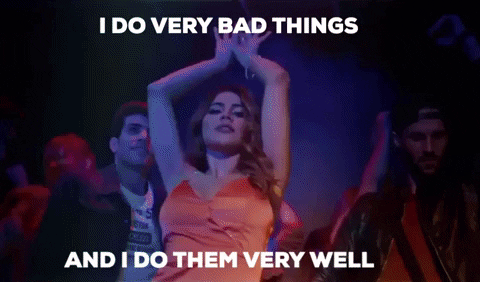
About a year after I wrote it, one of my friends who had been published under contract with Harlequin for years switched to self-publishing, and made about twice as much as she had under contract (she was making about $14k a book). She suggested I do it, but I didn’t have the time or energy (as I mentioned, writing is a hobby for me and not a life goal or anything). She also had the benefit of a following, a known name in the romance business, something I do not.
I am under no illusions about the limited demographic for Death Coach—it’s gritty and graphic in both violent death and sex. People who are reading Mills & Boon don’t want to read about cunts and sex in the dirt, and people who are reading hard crime aren’t expecting lots of explicit fucking breaking up their action. But I thought maybe I would go after self-publishing when I had time and see if the book found an audience.
So fast-forward several years (!) and this past August I had some time to explore options. My friend who has self-published used Ingram Spark, who have global distribution and don’t try to keep any rights over your product. I worked with her to setup the title on her account, so I didn’t have to start from scratch (but I think it’s pretty easy if you want to set up your own—although if you are getting the impression I am lazy about it, you are right).
One benefit of Ingram is the option to refuse returns, because sometimes authors actually OWE money when royalties go into the negative due to returns. So I used SpiroBooks.com for my layout, got the ISBNs myself, had the super-talented @jadedjo do my cover art, and voila, here we are.
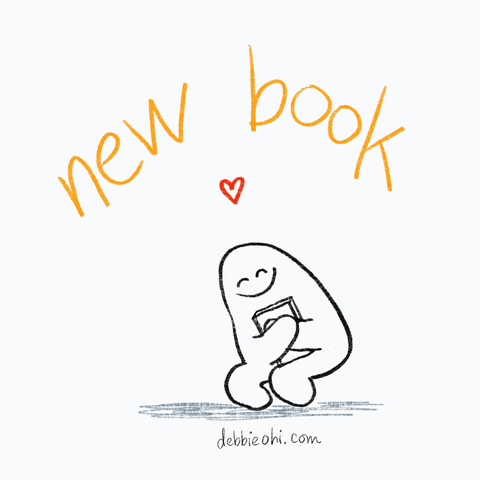
I think it’s important to stress again that I do this as a HOBBY. If I was interested in being a professional author who does it as a career, there were a lot of things I would do differently, including joining professional associations, spending more time and effort on finding an agent, and writing books that are commercial and similar to what is selling (or what the publishers told me they were looking for). Along the path, I had several opportunities to compromise and sell the book to other entities, but what was important to me was the fact this was written, I liked it as it was, and I had no real reason or motivation to change the story or rewrite, etc.
My goal in publishing this was to see if people liked it, and maybe make a series out of it if it was profitable. I do love Detective Walker and wouldn’t mind seeing what erotic adventures he has in the future, but I also am happy writing fanfic and working the dayjob. So we’ll see how it shakes out and if I should continue 🥰
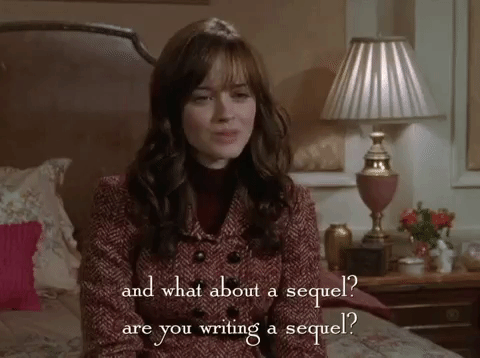
I should mention that I’m overwhelmed and touched by the immense support the book has here on tumblr and in fandom spaces with my friends. I love everyone who bought it (I think I don’t get sales stats until next month) and thank each of you for giving such a hard-to-categorize novel an audience.
I hope that answered all your questions @twinsoulvisionary! Thank you so much for the ask and interest, and I wish you luck in your own writing and publishing endeavors!!! 😘 Feel free to ask other stuff, you or anyone else with a question!
#authors on tumblr#books#publishing#self publishing#getting published#death coach#ask the author#novel
19 notes
·
View notes
Text
finding agents
so I’m currently going through the Publishers Marketplace which is an amazing resource for authors looking to find someone to represent them (also for authors looking for editors, boutique publishing houses, etc). It’s a very clear set up that lets you immediately tell what an agent is looking for, what company they belong to, what authors they represent, their websites and sometimes even a bit of their personality, all in a one shot, clearly categorized page. Now it’s been - a while since I went looking for an agent so take the rest of this post as a ‘learning with me’ as opposed to an ‘I’m an expert’ kind of thing.
first off, I pulled up agents and then I went for the most recently updated. I don’t know if that’s actual useful but it tells me who is on the ball when it comes to reaching out to authors, keeps me updated on what specific agents are currently looking for and saves me rocking up to their web page only to find they’re not currently accepting submissions. I’m probably missing some established agents that have been doing the same thing well for so long they don’t need to update regularly - but I gotta start somewhere and there are a LOT of agents out there to chug through.
second, dang, it turns out I’m a sucker for when an agent that actually puts their face on their page. Like, I really appreciate when they put pictures of books they’ve published because that’s very helpful but something about seeing another human’s face immediately triggers the ‘friend? friend!’ response in me. Probably because finding an agent seems so scary and also nebulous at the same time and having a face makes me feel less alone in it. Anyway, lots of agents out there with good faces and one guy with a face that made me go ‘boring business lecture on something my job requires but I know too well to sit through yet again’. Not saying this is a good way to sort through agents, just that I recognized after my third sidetrack, that I may have a built in weak spot for it.
third - why are so many of those nice faces I’d like to work with only interested in children’s books?
fourth, I’ve got to start paying attention to addresses at the top of the page. This is a world-wide kind of thing and while I’m sure they’re friendly, maybe getting an agent in Italy isn’t the wisest choice.
fifth, watch out for overlap. Each agent is listed by name and most agencies don’t like you querying several of their agents at the same time. Writer’s House is popping up a lot and to me that’s a good sign that they’re aggressively looking but since I’ve already queried one of their agents, I don’t want to query another before my grace period with the first one is over.
lastly, if things haven’t changed from the last time I did this, you really can’t put all your eggs in one basket. Query many agents at one time. Most of them are pretty busy so that’s several weeks worth of wait for a response sometimes and that’s too long to sit around doing nothing, especially if it ends up not being accepted. And don’t just rely on Marketplace either. I ended up with my last agent because one of my favorite author’s thanked him in the back of her book and I hit up his agency based off of that. Truthfully that’s actually my preferred method because it lets me find agents that are already representing the kind of book I’m trying to sell and obviously representing it well enough to get published. Unfortunately there are no bookstores within an hour’s drive of where I currently am and all my books are still in packing boxes.
Anyway, favor to us all, those currently looking and soon to be looking. The right agent is looking for us just as needle in a haystack as we’re looking for them. May we all be magnets.
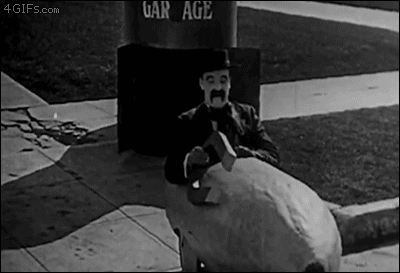
#publishing#publishers marketplace#writing#writing advice#book agents#the search goes on#getting published#working on it#okay to reblog#and to add to
12 notes
·
View notes
Text
Um, I just got my first acceptance letter? Published? Me?
6 notes
·
View notes
Text
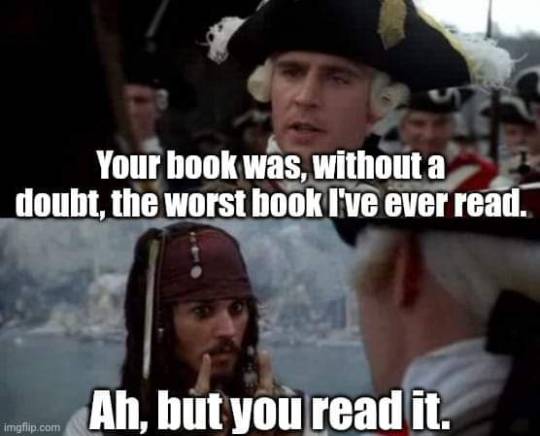
Me preparing for bad reviews if I ever get published.
16 notes
·
View notes
Text
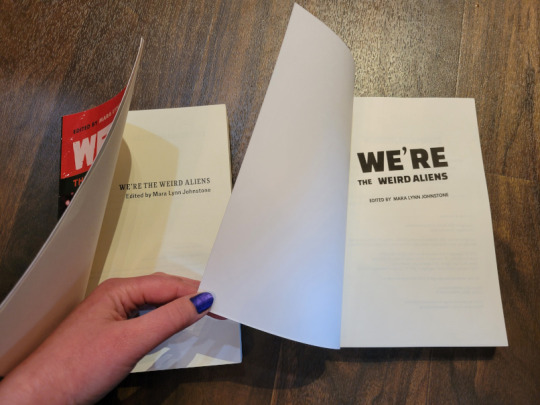
I finally got my copies! Delighted to report that the title page I designed myself looks much better than the one by the Fancypants Professionals who made the first one (and who wanted to charge me an absurd amount to renew it with them). (Suck it, price-gougers.)
Ahem. Hooray, the revised edition looks good!
#humans are weird anthology#the 'humans are weird' anthology#which tag did I use before?#sure would be great if they auto-loaded like they used to#anyways enjoy the glamour shot of the purple nail polish along with the books#that was a whim#it matches my sweater which I didn't plan#I forgot how bad nail polish smells#but it's pretty#and in this house we follow our joys#like this book#it sparks joy#have some more tags:#humans are weird#writer life#getting published#book recs#We're the Weird Aliens
48 notes
·
View notes
Text
A while ago I submitted a manuscript to a publisher, and apparently that signs me up to their newsletter. I just got an email from them with the subject line "How to become a published author." Dudes, I read your submission guidelines and I sent you the manuscript, the rest is kind of up to you now??!
10 notes
·
View notes
Photo



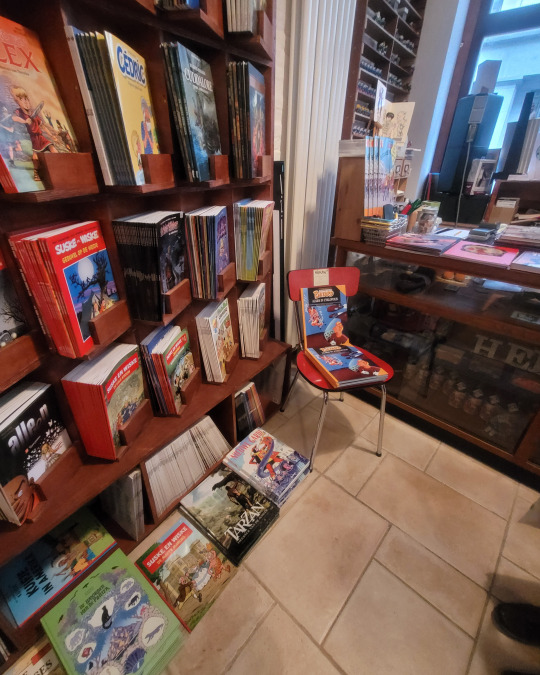
Yes, some original comic work of mine got published! Yay. It might only be four pages in this large comic anthology 9e Kunst set up but I love it. I decided to make something completely new for this and wanted to experiment with some materials to make it exciting. I am very thankful for this opportunity and when I saw a couple of these in a comic book store me and my inner child where screaming! This fuelled my drive for getting published even more.
I recommend everyone to buy this beauty. It’s quality work from new artists that you get the chance to find. You can buy it in comic shops or from me! (I get a profit, yay!) Just send me a message if you’re interested.
#comic#publishing#comic publishing#anthology#comic anthology#comics#strips zijn cool#comic shop#getting published#comic book#new artist#strip#stripboek#stripwinkel
5 notes
·
View notes
Text
What makes a great writing workshop and which lit mags offer them?
by Becky Tuch for Lit Magazine News
Several people have written to me recently about writing workshops. So, let’s talk about them.
First of all, as one of my readers pointed out to me, there are many different kinds of workshops being offered today. For someone new to all of this, it can be confusing. Here are some terms, as I understand them:
A seminar is a one-day session that will focus on a specific topic, i.e. “Polishing your first line until it sparkles like a unicorn.”
A generative workshop will mostly focus on producing pages, and typically there will be writing prompts, i.e. “Go deep into the recesses of your subconscious mind and don’t stop writing until your fingers fall off.”
A multi-week workshop is a space where writers typically work independently and then come to the group to share works-in-progress and get feedback. Typically published work is also discussed in order to examine specific craft elements.
A boot-camp is similar to a generative workshop, where the aim is to get you writing, thinking, and learning in a very compressed amount of time. (Burpees might be involved.)
There may be more varieties of workshop out there. But always, if you have any questions about what is being offered, you should contact the organizers. Before signing up and committing, you should know exactly what the class will entail.
Things to know include how many times your work will be read and discussed. (I’ve spoken to students who were frustrated with workshops because they thought they would get feedback on stories and never did.)
READ MORE
(including which lit mags offer workshops)
5 notes
·
View notes